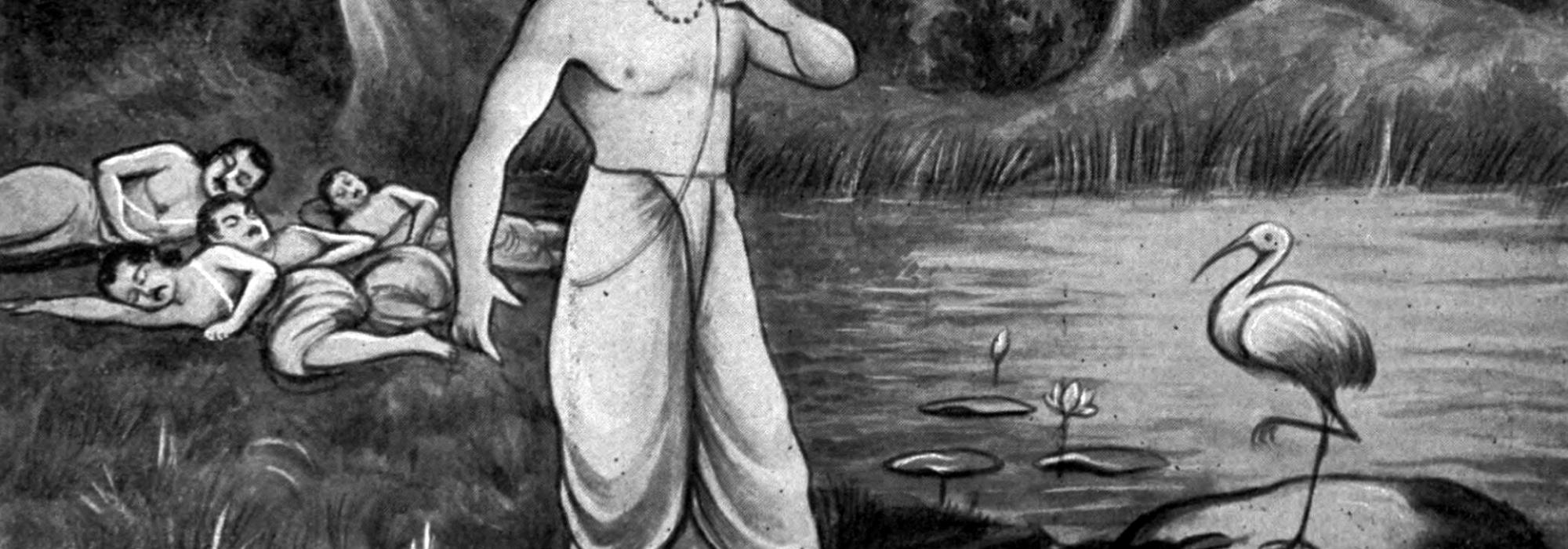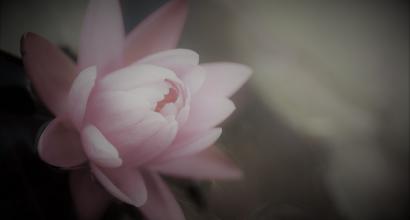In their years of exile, the Pandavas lived in the picturesque Dvaitavana abounding in beautiful trees and delicious fruits. One day, a deer carried away – between its antlers – the fire-producing sticks of a poor priest who was performing an important yajña. The priest came to the Pandavas seeking help. The five brothers took up their arms and went looking for the deer. Even after exhausting all their knowledge in hunting and combat, they were unable to catch the deer.
Tired, disheartened, and afflicted by thirst, they approached a banyan tree and spent some moments resting in the shade. Nakula climbed the tree and looked for a source of water. Finding one, he soon went in that direction with empty quivers to fill up water. He approached a crystal lake inhabited by cranes. He desired to drink some water to quench his parched throat when he suddenly heard a voice that forbade him to drink from the lake. But Nakula was thirsty and he proceeded to drink the cool water, disregarding the voice. The moment the water touched his lips, he dropped down dead. In succession, all the younger brothers of Yudhishtira came to the lake looking for the previous person, found them lying motionless on the ground, heard the divine words of caution, disregarded it and fell down dead themselves too.
The worried Yudhishtira decided that he would make the trip himself and came upon the celestial lake. By the side of the lake, Yudhishthira saw his mighty brothers on the ground, felled like logs of wood. Before investigating his brothers’ deaths, Yudhishtira decided to quench his thirst by drinking the water of the lake when he heard the divine voice. It was the voice of a Yaksha, who asked Yudhistira to answer his questions, after which he could drink the water.
[The Yaksha asks Yudhistira over a hundred questions. I’ve picked my top 20.]
Yaksha: How does one become empowered?
Yudhishtira: Courage and patience empowers one.
Yaksha: What is faster than the wind?
What grows more than strands of wild grass?
Yudhishtira: The mind is faster than the wind.
Our worries are more numerous than strands of wild grass.
Yaksha: What, when renounced makes one liked by everyone in the world?
What, when abandoned leads to no regret?
What, when renounced makes one wealthy?
What, when abandoned makes one happy and peaceful?
Yudhishtira: One who has renounced self-pride is liked by all.
When anger is abandoned, one become unaffected by sorrow.
Desire, when renounced, makes one wealthy.
When greed is abandoned, one becomes happy and peaceful.
Yaksha: Why are friends forsaken?
Yudhishtira: Friends are forsaken because of greed.
Yaksha: What is death for a man?
Yudhishtira: A poverty-stricken man is as good as dead.
Yaksha: What is poison?
Yudhishtira: Lust is the real poison.
Yaksha: What constitutes forgiveness?
Yudhishtira: Forbearance of dichotomy in the world is the greatest forgiveness.
Yaksha: Which is the invincible enemy?
What constitutes an eternal disease?
Yudhishtira: Anger is the invincible enemy.
Covetousness constitutes an eternal, incurable disease.
Yaksha: What is grief?
Yudhishtira: Ignorance is grief.
Yaksha: What is the meaning of charity?
Yudhishtira: Charity is the protection of all creatures.
Yaksha: What is envy?
Yudhishtira: Envy is nothing but grief of the heart.
Yaksha: What does one gain by pleasant speech?
Yudhishtira: One who speaks pleasant words is dear to everybody.
Yaksha: Who is truly happy?
Yudhishtira: One who is not burdened by debts is truly happy. He remains content and tranquil even if he cooks in his own house, eating a single meal with scanty vegetables.
Yaksha: What is the greatest wonder?
Yudhishtira: Day after day, countless creatures travel to the abode of death, yet those that remain have a desire to be immortal. What can be a greater wonder than that?
Yaksha: Which is the real path?
Yudhishtira: Mere argument leads to no certain conclusion. The scriptures differ from one another. There is not even one sage whose words could be accepted by all. The truth about dharma is hidden in darkness. Therefore, the path along which the great people have trod is the true path.
Yaksha: You have answered all my questions, O vanquisher of foes! Let one amongst your brothers – whom you may wish – rise from his eternal sleep!
Yudhishtira: Let my dear brother of dark hue and red eyes, who stands tall like a tree with a broad chest and long arms – let Nakula get up with life, O Yaksha!
Yaksha: It is said that Bhima is dearest to you. And you depend the most on Arjuna. Why then, O king, do you wish your step-brother to come alive? Forsaking the might of Bhima who possesses the strength of ten thousand elephants or Arjuna whose archery is worshipped by all, why do you wish Nakula to be revived?
Yudhishtira: If virtue is sacrificed, then one who commits that rash act is lost in the world. Dharma protects those who protect dharma. Knowing this, I don’t wish to forsake virtue and dharma. Non-violence and equality are the pillars of my personal religion. My father had two wives, Kunti and Madri. I am a living son for Kunti, but what of Madri? Let both of them have a child alive. This is what I wish for. As Kunti is to me, so also is Madri. I see no difference between them. I wish to act equally towards them. Therefore, let Nakula live.
Yaksha: Since you consider the virtues of non-violence and equality as higher than profit and pleasure, let all your brothers wake up alive!
As the Yaksha chanted these words, the fallen Pandavas arose. In a moment, their hunger and thirst left them and their senses were refreshed. It appeared as if they had awoken from sweet slumber.
References
Ganguli, Kisari Mohan. The Mahabharata of Krishna-Dwaipayana Vyasa. Book 3 (Vana Parva). South Asian Books, Calcutta. pp. 600-13
Kaushik, Sriman et al. Sreeman Mahabharata. Vol. 8 (Vana Parva). Bharatha Darshana Publications, Bangalore. pp. 4025-158
This article was first published in Daily O as part of my column Commonsense Karma.















































